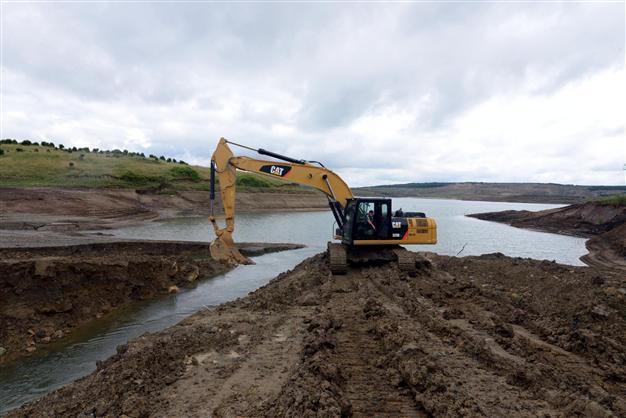Stagnation of Istanbul canal project causes plan changes in third airport
Hacer Boyacıoğlu ISTANBUL

The delay in the government’s Kanal Istanbul project, which aims to reshape Istanbul’s European side with an artificial waterway, has led to changes in plans for the third airport, as land excavated in the canal project was planned to be used to raise the elevation of the airport.
Reaching the desired elevation level for the airport, which is planned to be built on an area with many old open-pit coal mines that must be filled, requires around 2.5 billion cubic meters of filling material, which were set to be mostly taken from the Kanal Istanbul project excavation soil.
The construction of the airport, which is planned to be one of the world’s largest, officially started on June 7 with a groundbreaking ceremony, but several technical, financial and environmental problems continue to linger.
As the ambitious canal project that is championed by Prime Minister Recep Tayyip Erdoğan has been inching forward slower than expected, the third airport contractors have begun to work on reducing the initially planned altitude level, sources say.
The elevation level of the airport is likely to be decreased to reduce the amount of filling material necessary, although some authorities have warned that the airport’s land should be higher than a certain altitude above sea level for flight safety.
“The elevation of airports is crucial for planes to take off and land easily. If the airport’s altitude is lower than its surroundings, this could lead to adverse effects,” said Eyüp Muhcu, the head of the Turkish Chamber of Architects.
Muhcu also said that even a minor revision to the elevation level would require a full-scale calculation and in-depth examination.
A revision to the altitude level would likely reduce the costs for the contractors of the airport. The Cengiz-Kolin-Limak-Mapa-Kalyon Consortium, a joint venture of Turkish companies, won the construction tender on May 3, promising to pay the state 22.1 billion euros (plus taxes) for 25 years starting from 2017.
Construction costs for the flight hub, which is slated to be completed by the end of 2018, are estimated to be around 10.2 billion euros. The project will become operational in three stages, with the first stage expected to be completed by 2016.
Dozens of lakes in the area and the natural forested habitat will be razed to make way for the mega project, which will tie into the third bridge over the Bosphorus, which is also being built. The environmental effects of both projects have triggered public anger and raised questions about technical feasibility.
When fully completed in 2018, the new airport will be able to carry 150 million passengers a year, making it one of the world’s busiest airports.
 The delay in the government’s Kanal Istanbul project, which aims to reshape Istanbul’s European side with an artificial waterway, has led to changes in plans for the third airport, as land excavated in the canal project was planned to be used to raise the elevation of the airport.
The delay in the government’s Kanal Istanbul project, which aims to reshape Istanbul’s European side with an artificial waterway, has led to changes in plans for the third airport, as land excavated in the canal project was planned to be used to raise the elevation of the airport.